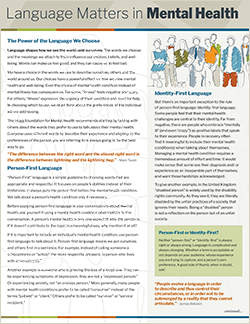Language matters in mental health. The words we use shape how we see the world–and ourselves. The words we choose and the meanings we attach to them influence our decisions, beliefs, and well-being. We have a choice in the words we use to describe ourselves, others, and the world around us.
 The Hogg Foundation for Mental Health recommends we start by talking with others about the words they prefer. Affirming the preferences of the person you are referring to is always going to be the best way to go.
The Hogg Foundation for Mental Health recommends we start by talking with others about the words they prefer. Affirming the preferences of the person you are referring to is always going to be the best way to go.
“The difference between the right word and the almost right word is the difference between lightning and the lightning bug.”
– Mark Twain
Neither “person-first” or “identity-first” is always right or always wrong. Language is complicated and always changing. Whether a term is acceptable or not depends on your audience, whose experience you are trying to capture, and a person’s own preference.
Effective communication starts with respect. We better promote mental health when we show respect for people from different cultures, backgrounds, or life experiences. When we practice inclusion, we improve our communication.
Once you develop greater awareness, knowledge, and skills about the culture of mental health, you may be surprised at how often hurtful language and labels are used in everyday conversation.
- How do we respectfully talk to someone about mental health conditions?
- Do we use person-first or identity-first language?
- What are the cultural impacts of the words we choose?
We’re sharing this updated mental health resource to help answer these questions. We can all do better in understanding the power of the language we use and how language matters. Please download and share this PDF.
For more tips, tools, and opportunities on mental health issues, follow us:
Facebook | Instagram | LinkedIn | Twitter | YouTube

